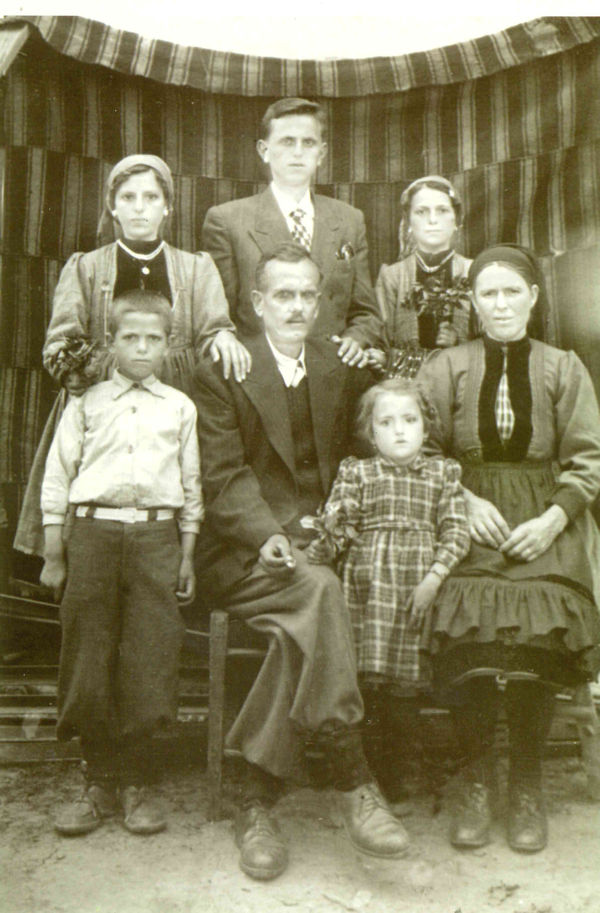
|
|
||||
|
|
||||
|
|
||||
|
|
THE EARLY YEARSMy name is Tanas Kirev (Athanasios Kirou in Greek) and I was born on the 14th of September 1931 in the Lerinsko village of Neret (Greek name Polypotamos) in Aegean Macedonia. I am the eldest child of Macedonian parents Velo and Magda Kirev. My parents had five children – my other siblings in order of birth were Fania (deceased 2010), Ristana (dec 2020), Pando and the youngest, Kata. My father, Velo Kirev, was third eldest of four sons to Kote and Yanna Kirev. My father's other brothers in chronological age were Mitre (eldest), Risto and Petre. My grandfather (dedo) Kote was a very respected, able and affluent member of the village. He constructed a water driven flour mill (vodenitsa) and owned numerous fertile fields (nivea) in which he sowed crops. Unfortunately, my grandmother died at an early age and he remarried a woman from Nesrum who had five children. My step grandmother had begged my grandfather to marry her saying that he was wealthy and that they could live a comfortable life together. He felt sorry for her and thought that it would be in the best interest for his four sons to have a mother figure present, so he decided to marry. As it turned out, his second wife looked out for her children and didn't give as much care and affection to dedo's children – often leaving them to go hungry.
My father Velo was a very thoughtful and considerate man. He was
the type of person who could do whatever he put his mind to. He was
a builder who had a hand in many of the best houses built in the village.
He could also do blacksmith work, shoeing horses and making saddles
and bridles for working animals as well as making wooden barrels.
As a result of being multi skilled, he was able to bring in money
from umerous Because my father Velo could see what his stepmother was doing,
he had a falling out with his father. When my mother was pregnant
with me, she had a craving and broke off a capsicum that was part
of a platted bunch strung outside to dry under the porch of the home.
She cooked the capsicum and ate it. As a result of this seemingly
petty thing, an argument ensued. Due to this and other prior incidents,
my father decided to move to his mother-in-lawfs house (dedo
Stase Marin). Dad's oldest brother Mitre also went to Australia. Whilst there, he obtained paperwork in the hope of bringing his two sons Vasil and Sotir and Striko (uncle) Risto (my father's other brother) to join him. Unfortunately, my step grandmother talked Vasil and Sotir into remaining in the village with her. As a result, my uncle Risto also decided to remain behind in the village. They wrote back to Striko Mitre to tell him of their decision to remain back in the village with baba. Striko Mitre was so disenchanted that he burned the permits. From all accounts Striko Mitre was a bit of a comedian and prankster
who worked during the depression living in campsites in and around
the Western Australian towns of Manjimup, Bridgetown and Pemberton
cutting sleepers for railway line construction. Sadly, his son Vasil
was killed during the second world war, fighting as a partisan. He
was killed Striko Mitre died a lonely man in Fremantle at around 1956, never having returned to his homeland. The sad part about this is that I arrived in Perth, Western Australia in 1955 and could have met him if I had been told sooner of his whereabouts by my Vuijko Stojan (mum's older brother) who kept in contact with Striko Mitre from time to time but didn't bother to tell me. During my early years and even before my time, our people endured
very difficult times with the region ravaged by constant political
unrest, wars, and poverty. When Greece gained control in 1913 of the
Aegean part of Macedonia, our people were forced to Hellenise, and
the Greek government ruled with a heavy hand. Everyone in our village,
as was the The Life Story of Tanas Kirev
|






